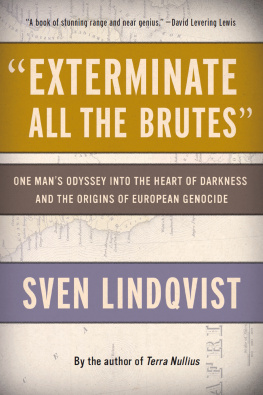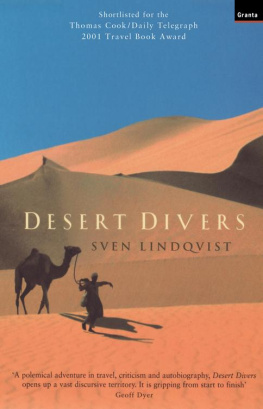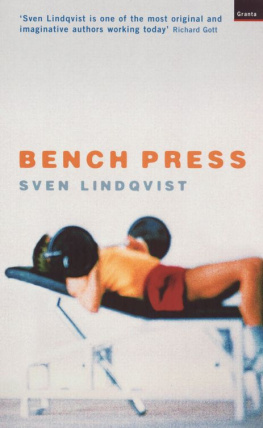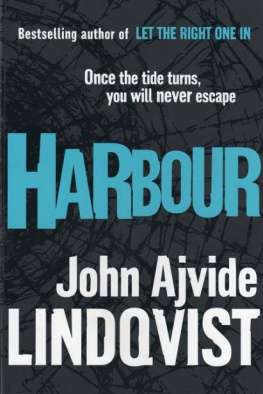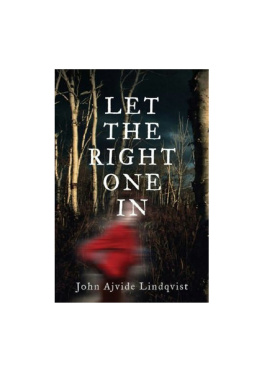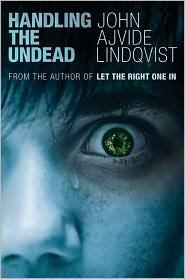Sven Lindqvist has published thirty books, including The Skull Measurers Mistake and A History of Bombing (both available from The New Press). He holds a PhD in the history of literature from Stockholm University, an honorary doctorate from Uppsala University, and an honorary professorship from the Swedish government. He lives in Stockholm.
Adam Hochschild is the author of seven books, including King Leopolds Ghost: A Story of Greed, Terror and Heroism in Colonial Africa and Bury the Chains: Prophets and Rebels in the Fight to Free an Empires Slaves.
Joan Tate (19222000) was an award-winning translator of more than two hundred books, including works by Ingmar Bergman, Kerstin Ekman, and Astrid Lindgren. She was a founding member of SELTA, the Swedish-English Literary Translators Association.
Sarah Death is a translator, a literary scholar, and the editor of the UK-based journal Swedish Book Review. She won the Bernard Shaw Translation Prize for Ellen Mattsons Snow. She lives in Kent, England.
ALSO BY SVEN LINDQVIST
A History of Bombing
The Skull Measurers Mistake: And Other Portraits of Men and Women Who Spoke Out Against Racism
Desert Divers
Bench Press
The Myth of Wu Tao-tzu


Introduction 2014 by Adam Hochschild
Exterminate All the Brutes 1992 by Sven Lindqvist
English translation 1996 by Joan Tate
Originally published in Sweden as Utrota varenda jvel by Albert Bonniers Frlag, 1992
Terra Nullius 2005 by Sven Lindqvist
English translation of Terra Nullius 2007 by Sarah Death
Originally published in Sweden as Terra Nullius: En Resa Genom Ingens Land
by Albert Bonniers Frlag, 2005
All rights reserved.
No part of this book may be reproduced, in any form, without written permission from the publisher.
Requests for permission to reproduce selections from this book should be mailed to: Permissions Department, The New Press, 120 Wall Street, 31st floor, New York, NY 10005.
Published in the United States by The New Press, New York, 2014
Distributed by Perseus Distribution
CIP data available
ISBN 978-1-62097-003-4 (e-book)
The New Press publishes books that promote and enrich public discussion and understanding of the issues vital to our democracy and to a more equitable world. These books are made possible by the enthusiasm of our readers; the support of a committed group of donors, large and small; the collaboration of our many partners in the independent media and the not-for-profit sector; booksellers, who often hand-sell New Press books; librarians; and above all by our authors.
www.thenewpress.com
Composition by dix!
This book was set in Scala
Printed in the United States of America
10 9 8 7 6 5 4 3 2 1
CONTENTS
Like many of the most original writers, Sven Lindqvist is hard to pigeonhole. He is not exactly a historian, for his graduate degree is in literature. He is not exactly a travel writer, for he has little interest in the colorful details that make a place seem exotic; he always wants to direct our attention back to our own culture. He is not exactly a journalist, for when he travels to far points on the globe, he is less likely to interview anyone than to tell us about his own dreams. His work does not come in predictable neatly tied packages: he travels through Africa meditating on Joseph Conrads Heart of Darkness but never reaches the Congo; he goes all the way to Australia to write powerfully about what its native peoples endured but chooses not to interview a single Aborigine. And, for that matter, hes not someone on whom I, or almost any American writer, can have the last word, for the great majority of his thirty-three books have not been translated from Swedish.
If there is an English-language writer whom Lindqvist reminds me of, it might be James Agee: also uncategorizable, also working in many genres, also at times forcing painful detail on his admirershis masterwork Let Us Now Praise Famous Men is not easy bedtime reading. Yet that book changed and expanded forever our sense of how to see the world, and, at its best, so does the work of Sven Lindqvist.
If you asked most Americans or Europeans, for example, to date the great tragic turning points of the modern era, they might say 1914, when World War I began and we saw the toll industrialized slaughter could take, or 1945, when the United States carried this to a new level by dropping two atom bombs on Japanese cities. If you asked Lindqvist, I think he would say 1898 and 1911. Why?
These dates, too, have to do with industrialized warfare; the difference is where the victims were. The year 1898 saw the Battle of Omdurman, during which a small force of British and colonial troops, Winston Churchill among them, in a few hours killed more than ten thousand Sudanese and wounded another sixteen thousand, many fatally, most of them falling victim to half a million bullets fired by Hiram Maxims latest machine guns. It was the first large-scale demonstration of what this horrific new weapon could do. Thirteen years later, on November 1, 1911, during another long-forgotten war, an Italian lieutenant named Giulio Cavotti leaned out of his open-cockpit airplane and dropped several hand grenades on two oases near Tripoli, Libya. It was the worlds first aerial bombardment.
In both cases, of course, the victims Lindqvist draws our attention to were colonial peoples. This, I think, is the insight and the driving passion at the core of the two books in this volume and of several of his others, particularly the remarkable A History of Bombingwhere he traces the genealogy of British terror-bombing of German cities in World War II back to similar targeting of civilians in a colonial war in Iraq more than twenty years earlier. To read Exterminate All the Brutes, A History of Bombing, or Terra Nullius is to be reminded of how incredibly Eurocentric a view of the world most mainstream historians have. We are accustomed to thinkingin the famous phrase of British foreign secretary Sir Edward Greyof the lamps... going out all over Europe in 1914 as a catastrophic war began and forget that they were extinguished decades earlier for people on other continents as they experienced European conquest.
Almost all of us educated in North America or Europe grew up learning that there were two great totalitarian systems of modern times, each with fantasies of exterminating its enemies: Nazism and Communism. Lindqvist reminds us that there was a third: European colonialism. And, most provocatively, he makes connections between it and one of the others.
Next page


